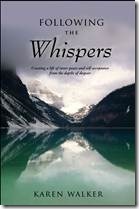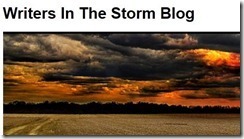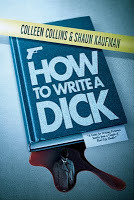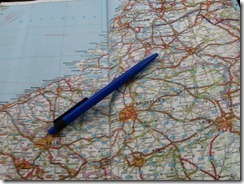Riley Adams's Blog, page 198
July 17, 2011
Finding Balance While Juggling Life—by Karen Walker
Please join me in welcoming my friend Karen Walker to the blog.
I love visiting Karen's blog, Following the Whispers, because it's a quiet oasis in my busy day. She helps me to think about life in a new light—and I appreciate her perspective. I've read her memoir and found it truly inspirational. Thanks for coming by today, Karen!
 I became a mom in 1973. We'd been through the Civil Rights Movement, the Womens' movement, the Viet Nam War. And the Mommy Wars--which, unfortunately, still exist--although it doesn't seem to be as much of an issue as it was back then.
I became a mom in 1973. We'd been through the Civil Rights Movement, the Womens' movement, the Viet Nam War. And the Mommy Wars--which, unfortunately, still exist--although it doesn't seem to be as much of an issue as it was back then.
When I gave birth, I was 24 years old chronologically, but not in maturity. I didn't have a sense of self, so trying to juggle my own needs with that of a baby and a husband and friends, etc. wasn't even in my consciousness. I was pretty much on auto-pilot, trying to keep my head above water.
Today, it is common for women to either work outside the home, or, as writers do, work at home, while raising our children, caring for our husbands, and maintaining a household.
The key to juggling all of the above is balance. They tell you when you are on an airplane to put your own oxygen on first, before helping anyone else. There is a reason for this. If you become unconscious, you are of no use to anyone. We must put our own well-being first. I wish I'd known this years ago--it would have saved me years of misery.
When we have kids, this can be most challenging, because we all know, if a child needs something, we drop everything to deal with it. So it becomes a matter of priorities. And the ages of our children and what they can manage on their own versus what needs our immediate attention.
The way I find balance is to only have a few key things I want to accomplish each day. That way, I don't overwhelm myself and can feel successful, rather than a failure because I didn't do what I wanted to do. I make priorities of those few things. On some days, only one or two things get done. The next day, the priorities shift so I can focus on what didn't get done the day before.
Another key to finding and keeping balance is learning to say no. Even to our husbands. And yes, even to our children. Because saying no to someone else is saying yes to ourselves. This is not selfish, as we may have been taught. It is crucial to inner peace and well-being.
To summarize, get clear about what is important to you. Make the time to do it. Say no to non-crisis distractions. And learn to balance your priorities so that you feel successful.
Elizabeth, you seem to juggle your life beautifully. Thanks for giving me the opportunity to blog here about such an important issue.
Blessings,
Karen  Karen Walker is a writer who has published essays in newspapers and magazines, as well as an anthology series. After a 30+ year career in marketing and public relations, she went back to college to complete a Bachelor's degree and graduated Summa Cum Laude in 2005 from the University of New Mexico's University Studies program with a major emphasis in Creative Writing. She lives in Albuquerque, New Mexico with her husband, Gary, and their dog, Buddy. When she's not writing, you can find her doing international folk dancing, singing at retirement communities with her trio, Sugartime, hiking, reading, or hanging out with friends.
Karen Walker is a writer who has published essays in newspapers and magazines, as well as an anthology series. After a 30+ year career in marketing and public relations, she went back to college to complete a Bachelor's degree and graduated Summa Cum Laude in 2005 from the University of New Mexico's University Studies program with a major emphasis in Creative Writing. She lives in Albuquerque, New Mexico with her husband, Gary, and their dog, Buddy. When she's not writing, you can find her doing international folk dancing, singing at retirement communities with her trio, Sugartime, hiking, reading, or hanging out with friends.
You can find Following the Whispers: at:
July 16, 2011
Twitterific

![Terry3_thumb[1]](https://i.gr-assets.com/images/S/compressed.photo.goodreads.com/hostedimages/1380447585i/1701687.png)
Below are writing links that I've posted to Twitter in the past week.
Hope you'll enter this month's WKB giveaway for a chance to win Donald Maass' excellent Writing the Breakout Novel, from our friends at Writer's Digest. Enter the drawing by signing up for the WKB newsletter.
Finger Lickin' Dead released June 7th. Hope you'll consider it if you enjoy mysteries, or know someone who does.Download it on Kindle: http://amzn.to/kh7MAp Mass market paperback: http://amzn.to/lfUE2N ($6.99)
Tomorrow I'm looking forward to hosting Karen Walker on Mystery Writing is Murder. Hope you'll come by!
Making Time to Write Despite the Never Ending To Do List: http://bit.ly/rfpixb
Digital lit: How new ways to read mean new ways to write (Globe and Mail): http://bit.ly/nEz6bY
The Kings Speech - Why is this such a Great Bad Movie? http://bit.ly/r49QZc @StoryMeBad
Why So Few Men Join Book Groups: http://bit.ly/oyHqI2
How some famous crime fiction sleuths got into the business: http://bit.ly/n1J2rX @mkinberg
The Writer as Detective (NY Times): http://nyti.ms/pYkGpe
An overlooked form of marketing--volunteerism: http://bit.ly/ot1c1y @MariaZannini
Best practices for the professional writer: http://bit.ly/nSRjhB @JourneytoFree
Writing for the reluctant teen reader: http://bit.ly/ounoG3
Writing urban fantasy vs. steampunk: http://bit.ly/qhLJNB
Stop Procrastinating By Thinking of Your Future Self: http://bit.ly/puZPqP
10 Ways to Keep a Long-Term Character From Being Hated: http://on.io9.com/rsJ7GD
Roving body parts: http://bit.ly/pnXOHw @authorterryo
Why gratitude is vital for writers: http://bit.ly/nQoe25
7 Tips for Writing a Film Review: http://bit.ly/pXr6Df
Why 1 writer/artist loves Google+ & her tips for newbies: http://bit.ly/obIcU5 @inkyelbows
6 tips for helping writers suspend reader disbelief: http://bit.ly/oRLqjv @damesofdialogue
A nice how-to on creating an ebook: http://bit.ly/oEBpVg
Censoring Books for Kids: http://bit.ly/rcb2Pn @jemifraser
Nice link roundup by 2 historical writers: http://bit.ly/o7I6J4 @2nerdyhistgirls
Fluffing up a flat character: http://bit.ly/olUF17
Fast and Easy Guide to Writing Characters of the Opposite Gender: http://bit.ly/r2QpJh @KMWeiland
Why Your Creativity Is Stuck On Shuffle And You're Not Hearing A Single Song: http://bit.ly/okpcHT
Magical Rooms in Fiction: http://bit.ly/qXfcpR @AwfullyBigBlog
Everything You Wanted to Know About Digital Publishing But Were Afraid to Ask: http://bit.ly/pCKrr8 @DearAuthor
Sex and the Novel: http://bit.ly/oYSkW7 @Sarafurlong
How Much Should an Author's Ebook Royalty Be? Some number crunching: http://bit.ly/pvfEl9 @kellymcclymer
Metafiction: The Forgotten Transformer: http://bit.ly/nOFFl1 @yaHighway
9 Tips For The Perfect Pitch: http://bit.ly/njpYCp
Lessons from the Movies--Planting and Returning Images to Create a Satisfying Ending: http://bit.ly/nhDO8D
Tips for getting in the writing zone: http://bit.ly/oltcpS @SarahKetley
Improving Creativity: The Connect Brainset: http://bit.ly/qkVl8p @lkblackburne
6 great heroes of epic fantasy: Part 1: http://bit.ly/oUhkZj and 2: http://bit.ly/oXQoba
Things not to do as a writer--the rush to publish: http://bit.ly/o9bOfr @LisaKilian
The truth is out there: sci-fi doesn't have to be stupid (Brisbane Times): http://bit.ly/p6nFP3 @brisbanetimes
Writers and Doubt: http://bit.ly/p81WwQ
The real Secret Garden (Telegraph): http://tgr.ph/ozKGuh
The writer takes a walk: http://bit.ly/oVSlRz
The Best Way to Embrace a Negative Review: http://bit.ly/qqqpJ5
Write what you know...or not: http://bit.ly/qsZhma
When writing is hard, write in a herd: http://bit.ly/nIjjBP @BWBODRasch
Tips for crime writers for avoiding "Cabot Cove Syndrome": http://bit.ly/ncGFG4 @authorterryo
5 Steps to Writing a Killer First Chapter – How to Wow Readers: http://bit.ly/nqMNW8
3 protagonists walk into a bar: http://bit.ly/nJGPAI
Tips for writing action well: http://bit.ly/rs165T @Juliemusil @lisagailgreen
Using tarot cards to develop your story: http://bit.ly/qmwgyd @joanswan
The Importance of Knowing & Writing For Our Target Readers: http://bit.ly/poiYUs @JodyHedlund
Identifying the specific reason behind procrastination and making steps to work through it: http://bit.ly/mRqawn
Personalized publishing advice--where to get it? http://bit.ly/q37dES
One writer's 10 favorite writing lessons: http://bit.ly/nGgPxv @jhansenwrites
Handling Content Edits: http://bit.ly/pyNrIe @KatieGanshert
Hands-on plotting: http://bit.ly/pmDER9
A former D&D gamer offers us 10 types of character quirks: http://bit.ly/r1PX4Q @CherylRWrites
An agent on what to do when you get an offer: http://bit.ly/nSXb5N
How to Write a Non-Fiction Query Letter: http://bit.ly/qAkoyT
5 Tips for Making a YouTube Promo Video: http://bit.ly/phhjSz
Writing Historical Fiction: Daring to Own an Icon: http://bit.ly/pDySEm @BTMargins
Getting started with Google+: http://bit.ly/mWYERp
Basics of writing--keeping it fresh: http://bit.ly/rnAkBP
When artificial intelligences start using contractions: http://bit.ly/ph9Phq
Don't lie in query letters: http://bit.ly/qKUDKk
How writing is like ironing linen: http://bit.ly/oDo4Cl
Stop talking about writing and write: http://bit.ly/rjz3AH
3 Ways to Sell Yourself as an Online Writer: http://bit.ly/ph5hmY
Legacy Publishing vs Self-Publishing: Can You Do Both? http://bit.ly/qzwi5f @AJackWriting
Union & Guild Resources for Writers: http://bit.ly/nKX8Kh @galleycat
Why You Can't Buy Creativity: http://bit.ly/qQI0Ka
How *not* to support local bookstores and coffeehouses: http://bit.ly/odNIqF @NinaBadzin
How flexible are you? http://bit.ly/o8PC53 @JodyHedlund
10 Ways to Reach Your Word Count Goals: http://bit.ly/pbpk9e @elspethwrites
How to break your book into chapters: http://bit.ly/oiNSLl @PublishingGuru
A primer on your publishing options: http://bit.ly/r18AkX @HartJohnson
Agents as Publishers: http://bit.ly/nYd7gH @LauraPauling
3 types of mushy book middles: http://bit.ly/q3rutw @FantasyFaction
Dialogue and The Telephone: http://bit.ly/p34RGh
Self-editing checklist--externals: http://bit.ly/rgcc3t
YA vs. Romance Sex Scenes: http://bit.ly/pjJJT5 @yaHighway
3 mistakes 1 writer observed a newbie make at a recent convention: http://bit.ly/pcj7Jz
Why you should become more flexible as a writer: http://bit.ly/pQ717U
How to Throw A Book Party That Rocks: http://bit.ly/o1Uj5o @BTMargins
Editing-Meet the Novel-Killer: http://bit.ly/oog4yk
Taking the "Spookiness" Out of Ghostwriting: http://bit.ly/oMH5p7
Writing A Linked Series - An Agent on Why some work and some don't: http://bit.ly/qBtpIF
6 tips for growing characters: http://bit.ly/qSFsyp @WriteAngleBlog
A Guide to Colloquial Contractions: http://bit.ly/qtnkeI
Why Small Ebook Presses are Thriving And How You Could Join Them: http://bit.ly/ng4YEa @thecreativepenn
Performing plot CPR: http://bit.ly/nitE59 @JulieMusil
Do authors have to be attractive in this business? And mine their personal history for promo? http://bit.ly/ocWQpo @nicolamorgan
How writing and driving are similar: http://bit.ly/osQdvt @LesaHolstine @ThomasKaufman,
5 simple math skills every writer should know: http://bit.ly/qIcO7K @
Cross-marketing your books--locating alternative markets: http://bit.ly/qY4BhP
12 Ways to Turn Your Old, Dusty Blog Archive into Cold, Hard Cash: http://bit.ly/pqCAer
Article Revision Using the Pointings System: http://bit.ly/qC2bTz
How authors can benefit from using YouTube: http://bit.ly/n8IFVn
WordPress Plugins that Make Your Blog Comments Social: http://bit.ly/oLPYJA
Book writing is agony, with little reward. Why is it still pursued? NY Times: http://ow.ly/5DO9y RT @JaneFriedman
Agents are no longer relevant to authors? An agent says no: http://bit.ly/pSNkje
Tyranny of "The Numbers": http://bit.ly/nnEOnK
Dear Young Writer: Advice to Your Younger Self: http://bit.ly/q0ZRXL
The Death of the Publishing IT Department? http://bit.ly/pjspJS @pubperspectives
Google+ Hangouts for Writing Groups: http://bit.ly/q5JdMb @galleycat
4 Elements of a Great Book Signing: http://bit.ly/nHxZno @PimpMyNovel
The 7 Stages of Writing a Sequel: http://bit.ly/nZGbos
How To Sell Songs Inside Your eBook: http://bit.ly/rgm59B @GalleyCat
7 Sound Techniques for Effective Writing: http://bit.ly/oS0bpp
Twitter tools for authors--Twellow and Grader: http://bit.ly/qU2Q6e
Why your reader is your co-writer and 6 tips for letting readers fill in the blanks: http://bit.ly/nWJw4x @KMWeiland
A deep editing analysis that demonstrates the power of cadence and specificity in writing: http://bit.ly/neyG9z @jhansenwrites
16 Ways Fiction is Usually Different than Reality: http://bit.ly/qT7kuu
2 PIs explain white collar crime to crime writers and give tips for writing it: http://bit.ly/nshtCX
How to work theme into your novels: http://bit.ly/qbjrfQ @DirtyWhiteCandy
Making Critical Character Traits Part of Your Plot: http://bit.ly/qVL6AW
What Readers WON'T Miss about Corporate Book Publishers When They're Gone: http://bit.ly/ot0uVm @AnneRAllen
Tips for writing your 1st scenes: http://bit.ly/n7msBR
The dreaded flashback: http://bit.ly/noGjYG
How to speak publisher - C is for Cover: http://bit.ly/nccNZs
Managing Your Time as a Writer: http://bit.ly/qqYeqj
The art of rocking out your identity crisis so you can go on to rule the world: http://bit.ly/oAOY2a
How much description? http://bit.ly/p11bQL @JulietteWade
Tips for providing value on Twitter: http://bit.ly/pv1dsQ
World Building-Part 2: Social and Cultural Aspects: http://bit.ly/nrUPAb
5 must-do publicity tips: http://bit.ly/qpQ0no
The Surprising Key to Becoming an Authority: http://bit.ly/q0mOEX
7 Reasons Creative People Don't Talk about Money: http://bit.ly/qNWNnv
Tips for bringing scenes to life: http://bit.ly/qE1F0J @4kidlit
Have white-board, will plot: http://bit.ly/px9XJT @yaHighway
The Lies Screenwriters Tell (Themselves): http://bit.ly/p4wdzQ
10 public speaking tips: http://bit.ly/pDL9yx @katiewardwriter
Who has authority online? @JaneFriedman with answers: http://bit.ly/qaHqRQ
Is your book's middle saggy? Losing motivation halfway through? Don't give up! Some tips: http://bit.ly/o425Ct @jhansenwrites
The 7 Deadly Sins of Writing: http://bit.ly/pH42sy
Self-Publishing is Like Playing Baseball: http://bit.ly/pNjO82
5 Reasons Why Your Writing Matters (Even if No-One Will Take You Seriously): http://bit.ly/ofMVip
A Google+ cheat sheet: http://bit.ly/npVzr6
12 Easy Steps to The Making of a Book Trailer: http://bit.ly/kP5jpk
Fixing Problem Pacing: http://bit.ly/qHO7Fb
Genre Interruptus: http://bit.ly/ofT0Io
Why copywriting is the secret to building a popular blog: http://bit.ly/pA6m8Y
How to Delete Half Your Facebook "Friends": http://bit.ly/qfdRkb
10 Greatest Unintentionally Hilarious Lines from SF&F: http://on.io9.com/q8cnA9
10 Fantasy and Science Fiction Copycats that Actually Improved on the Original: http://on.io9.com/nHam8t
Getting ISBNs in Canada: http://bit.ly/oUblTz @JustusRStone
Keeping Your Promises To Readers: http://bit.ly/pTnwq6 @ajackwriting
An Agent Answers a Writer's Question on Collaborative Writing: http://bit.ly/nST1u1
How to Cure Writer's Block and Stay Productive: http://bit.ly/nHX6rb
A Writer's Must-Read List: http://bit.ly/nh2uSk @on_creativity
Tips for formatting your manuscript: http://bit.ly/oPlX6i
On rejections: http://bit.ly/nCaoc1
That book was edited? http://bit.ly/qHeIBm
Keeping the Vision in Revision: http://bit.ly/owbtIy @BTMargins
Creating Cover Art: Down & Dirty Tips: http://bit.ly/pnYzC1
Making Marketing More About Them & Less About Us: http://bit.ly/npT2Ha @JodyHedlund
Manipulating Your Reader for Better Plots: http://bit.ly/q1HNP4
An e-publisher says not to query them if you won't blog or tweet: http://bit.ly/nFcXAa
July 15, 2011
Why We Practice Our Writing
 I mentioned last week that I was preparing two books to e-publish. I wrote one of the books three years ago. The other is a book I wrote five years ago.
I mentioned last week that I was preparing two books to e-publish. I wrote one of the books three years ago. The other is a book I wrote five years ago.
The book that I wrote three years ago was definitely easier for me to edit. I did remove some 'telling' references and created a deeper POV for the story.
The book that I wrote five years ago? It's taking me forever to edit it.
The problem with the book I wrote five years ago isn't a mechanical problem or grammatical problem.
It's definitely that it's just not a very mature book. I'll read along a little bit and think, "Why would this character do that?" or "Why did I spell out that this character was getting into their car and driving across town? Why not just start the scene across town?"
There's something on every page that I'm deleting, adding, or completely rewording. The only thing that seems really solid is my voice. I'm thankful that's intact or else I'd have to write the book over from scratch.
I'm lucky that I've got a few weeks where I'm not really under any pressing deadlines (except to read my pass pages for the next Memphis book…coming out in November.) So I think I'll just spend some time updating this book and hopefully raising the writing bar to at least my current level of ability.
Sometimes I wonder if showing up every day to write is doing anything for me. Am I actually getting better?
But then, looking back over stuff I've written 3-5 years ago, there's no question of the improvement. Every day you open up that laptop or notebook…..no matter what your goal is—a weekly goal, a monthly goal, whatever…you're improving your craft.
Have you got any old manuscripts? Can you see a difference in your writing from long ago?
Fixing Book Middles and Staying Motivated to Finish Our Book
 Today I'm at the Writers in the Storm blog (a great resource for writers, if you haven't visited), talking a little about book middles.
Today I'm at the Writers in the Storm blog (a great resource for writers, if you haven't visited), talking a little about book middles.
Middles can be tough—not only is it where our plots might start getting a little saggy, they're also where we might lose motivation to finish our book…and when Shiny New Idea syndrome is most likely to strike.
Hope you'll join me there!
July 13, 2011
The Black Heart of White-Collar Crime by Colleen Collins & Shaun Kaufman
 In 1939 sociologist Edwin Sutherland coined the term "white collar crime." He wrote, "White collar crime is crime committed by a person of respectability and high social status in the course of his occupation." It was a radical redefinition in criminal law as Sutherland was making distinctions not on the basis of an act or intent, but according to the status of the accused.
In 1939 sociologist Edwin Sutherland coined the term "white collar crime." He wrote, "White collar crime is crime committed by a person of respectability and high social status in the course of his occupation." It was a radical redefinition in criminal law as Sutherland was making distinctions not on the basis of an act or intent, but according to the status of the accused.Unlike Edwin Sutherland's definition, the U.S. Department of Justice's formal definition of white-collar crime disregards class or economic status. However, government prosecutors are far more likely to indict the "upper-class" businessman who works for a major corporation than the middle-class grandmother who buys counterfeit medications from Canada.
The general components of white-collar crime:
• It is a non-violent, illegal act that principally involves deception, deceit, concealment, manipulation, breach of trust, subterfuge or illegal circumvention.
• It is typically committed by a business person or public official
• Its evidence usually involves a "paper trail" that investigators use to prosecute the case.
There are numerous types of white-collar crime, including antitrust violations, bankruptcy fraud, cell phone fraud, credit card fraud, counterfeiting, credit card fraud, environment schemes, healthcare fraud and insider trading.
PIs Who Specialize in White-Collar Crime
As with any crime, there are investigative procedures, then there's the creativity, experience, tenacity and intellect of the investigator. That last one – intellect – is key for an investigator who specializes in white-collar crimes. A homicide detective we know claims that all homicides are easy. He claims that unless they're strategized by organized crime (for example), they're typically cases whose clues are easily followed.
Alternatively, criminals who practice white-collar crime are smart. They are usually highly educated, savvy and familiar with how to manipulate the inner workings of business. A PI who investigates a white-collar crime case has to match wits with these criminals to uncover the crime. Plus, the practice of private investigations is just as much an art as it is a science, so a successful investigator always thinks outside of the box while also applying concepts and procedures.
Next, let's analyze one of our white-collar crime cases by looking at our investigation goals, tasks, unforeseen glitches and end result.
Case Example: The Case of the Disappearing Money
Investigation Goal
An attorney who specializes in probate, elder law, and estate planning/administration asked our investigations agency to investigate what had happened to the money that disappeared from a family's trust fund. The family already suspected a specific member.
Investigation Tasks
Our investigations on the suspected family member included the following tasks:
• Researching public records for significant purchases for land, cars and other high-price-tag items.
• Researching purchases made by the suspect's daughter and son-in-law. Our investigation revealed that the son-in-law had come unexpectedly into large amounts of money that he had used to fund large purchases, one being a new home.
• Checking records in the assessor's and clerk of recorder's offices. We learned the suspected family member had acquired an interest in a pricey downtown condo.
• Surveilling the suspected family member. Although she claimed to be unemployed, we discovered she suddenly had sufficient amounts of money to attend a university full time.
• Investigating suspected family's member's claim that she occasionally babysat for another family member to earn some money. Our investigations, including surveillance, showed she never conducted any babysitting, and that the children in question were enrolled in a daycare that the suspected family member had no ties to.
Unforeseen Glitches
The object of our investigations learned from another family member that private investigators were watching. Therefore, the suspect became cautious, and spent a lot of time looking around the corner whenever they left the house. Too bad that they left so much evidence in public records regarding their acquisitions using family money.
End Result
The lawyer applied for a court order forfeiting the ill-gotten property back to the deceased person's estate. In other words, the pricey downtown condo was taken over by the family members who had been ripped off.
Writing a Sleuth Who Specializes in White-Collar Crime?
If so, think about these character attributes:
• Does she have a background in business or accounting? Is he a former nurse or health care professional? In other words, does your sleuth have training or expertise ancillary to the white-collar crime?
• How identity theft often dovetails with other white-collar crimes. For example, criminals conducting health care fraud often also need to know how to obtain, or buy, personal information such as people's SSNs. Therefore, it's beneficial for a sleuth to have contacts/informants in the identify-theft community.
• Does your fictional sleuth have inside contacts in hospitals, insurance companies, doctors' offices who can provide intelligence?

Thank you to Elizabeth Craig for hosting us today as guests at "Writing Is Murder"! We're giving away a gift Kindle version of How to Write a Dick to one of today's readers who posts a comment/question (name will be randomly picked before midnight today – please be sure to leave your email address for notification). If you don't have a Kindle, there are free downloadable Kindle apps for PCs and Macs (we use the downloadable app at home, and it's great).
Colleen Collins and Shaun Kaufman are co-owners of Highlands Investigations in Denver, Colorado. Their ebook How to Write a Dick: A Guide to Writing Fictional Sleuths from a Couple of Real-Life Sleuths, is available on Kindle and Nook.
Colleen Collins is a co-owner of Highlands Investigations in Denver, Colorado. Her articles on private investigations have appeared on various Internet sites as well as in PI Magazine, Romance Writers Report, Pursuit Magazine, PInow.com and other publications. She is an active member of the Private Eye Writers of America and the Mystery Writers of America. She has written 20 novels for both Harlequin and Dorchester, several of which have placed in the finals for national competitions, including the prestigious Holt Medallion and RITA awards.
Shaun Kaufman, co-owner of Highlands Investigations, has worked in and around the criminal justice field for more than 30 years, as a former trial attorney and a current legal investigator. He has published articles in PI magazine, the Denver Law Review, as well as authored numerous briefs for the Colorado Court of Appeals, Colorado Supreme Court and the 10th Circuit Court of Appeals. As a trial attorney, Shaun hired and managed private investigators, training them on such issues as ethics, death penalty litigation, homicide and gang evidence, and search and seizure techniques.
Quotes"Forget Google and Bing. When you need to research PI work, go to the experts, Colleen Collins and Shaun Kaufman: they live it, they teach it, they write it. How to Write a Dick is the best work of its kind I've ever come across because it covers the whole spectrum in an entertaining style that will appeal to layman and lawmen alike. This will be the industry standard for years to come."
- Reed Farrel Coleman, three-time Shamus Award winner for Best PI Novel of the Year and author of Hurt Machine
"If you want authenticity in creating a fictional private investigator for your stories, then this is a must-have reference book. Its authors, Colleen and Shaun, are living, breathing PIs with years of actual experience in the PI game."
- R.T. Lawton, 25 years on the street as a federal special agent and author of 4 series in Alfred Hitchcock Mystery Magazine
Becoming Flexible
 My writing friend Jody Hedlund has an interesting post today on being flexible.
My writing friend Jody Hedlund has an interesting post today on being flexible.
Traditionally, I've not been the most flexible person, internally What that means is that, if I'm volunteering for you at school, or if you're a friend that I've got a lunch date with, or if my child is coming to your house to play, and your plans change suddenly—I'm extremely pleasant and understanding about it on the outside. "It's no trouble at all. No, I totally understand. We'll take a rain check."
On the inside, though, I'm a big mess. My day has changed in a way I wasn't prepared for. Now I need to look at all my lists and switch them out. Figure out a new game plan. It stresses me out. Which is ridiculous, but I'm Type A . It's just the way I am.
Writing, actually was the first place I learned to be flexible.
This, I attribute completely to the fact that even rats in mazes can be trained to recognize rewards for successes. They'll remember the successful path through the maze to end up with the treat at the end. And every single time I was flexible with my writing, I ended up with some sort of small success or reward.
I responded to stimuli. :)
It started with my first editor. I'd actually hired an independent editor back in 2003ish. He was the kind of editor that took no prisoners and didn't suffer fools lightly. I'd never, ever shown anyone my fiction, so this was a rough initiation into revision for me. On the one hand, since I grew up with my English teacher dad, my grammar and mechanics were in good shape. But there was all kinds of stuff that needed to be ironed out with showing-not-telling, etc.
I suffered through the process. It irritated me to make changes to a manuscript that I thought was good enough to sell. I made all his suggested changes, but saved an old copy that I didn't revise. And, was astounded to discover that his suggestions made my book much better.
To this day, 9 times out of 10 I take the suggestion of first readers and my editors.
Then there was the querying process. Which took forever for an impatient person like me. I was absolutely bent on having a particular agent at this particular agency. I'd done the research and this person seemed like the perfect match.
Then came the rejection.
I remember actually thinking that I'd just write another book and try again to hire this particular agent. But I realized that wasn't an effective Plan B. Instead, I was flexible and started sending out queries to many agents who represented cozy mysteries. And got another flurry of rejections. So I decided to change the plan again and send directly to targeting publishers.
And ended up with a contract. Another little reward for flexibility.
Promo was another area where I needed to learn flexibility. I wasn't wild about promoting. I wasn't happy about leaning social media. I don't enjoy selling things.
Being flexible with marketing means that not only have I sold many more books than I would have if no one knew me, but means that I've also developed many online friendships along the way.
Now I'm trying to be flexible again. I'm trying to respond to a changing publishing industry. Which is hard—I worked hard to get published traditionally. But I'm quick to recognize change (even if I never like change), and so I'm preparing a book I wrote several years ago for e-publishing.
This hasn't been easy for me, either. I've been used to having a publisher's art department come up with concepts, having them to the interior book design, not worrying at all about the actual process of publishing a book. But I'm going with the flow again—why not publish both ways? That way I've got all my bases covered. Flexibility.
Now if I can only be flexible when my children's plans for the day change! I'm working on it.
How flexible are you as a writer? Have you seen a payoff when you are?
July 12, 2011
Finding the Underlying, Specific Reason for our Personal Procrastination
There are many different kinds of things I put off.
Replying to emails. Making a doctor's appointment for a family member. Writing a particular scene in a book.
I've found that if I can just identify why I'm putting something off , I have a much higher chance of finally finishing the task.
Not answering an email? Is that because I have to check a particular date and I don't have my calendar near me? Because I need clarification on what the original emailer is asking of me? Because I need to plug a conference into my GPS to find out if it's within drivable distance?
Not making a doctor's appointment? Is that because I'm not sure what type of specialist would handle the particular medical issue? Because my family member's schedule is too in-flux to nail down an appointment date? Because I haven't researched what questions to ask the physician?
Not writing the next scene in my book? Is that because I feel the character's motivation isn't clear? Because I'm not sure how I want the scene to end up? Because I'm not sure how to approach the scene—with tension? Humor? Action? Pathos? Because I'm not sure the scene is necessary? Because I'm worried I'm repeating myself?
Once I've identified what's making me stall, it's easy for me to make a list of steps to finish the task.
The email—pull out my calendar. All my calendars. Email the person back to make sure I understand what they're asking. Take out my GPS and figure out the conference location and whether it's feasible for me to attend.
The doctor's appointment—set a timer and research the issue online to prepare. Call my family doctor for specialist recommendations. Make the appointment, knowing nothing is set in stone and appointments can be changed, if needed.
Not writing the next scene? Skip it and come back to it later. Make lists of all the ways the scene is improbable. Make lists of all the ways I could fix that improbability. If the character motivation is in question, what would make this particular character want to do this particular thing? Is there something in his backstory? Some fear or desire? Label it and incorporate it into the story. Not good at writing action or a tension-filled scene? Set aside 20 minutes to research writing blogs for tips.
Do you sometimes procrastinate? What's your method of working through it?
July 10, 2011
Fluffing Up a Character
 I mentioned during my post on outlining, that I'd found that the outlining process tended to flatten my characters out. I'd had to fluff them up later, during revisions.
I mentioned during my post on outlining, that I'd found that the outlining process tended to flatten my characters out. I'd had to fluff them up later, during revisions.
So I got a tweet asking exactly how one goes about fluffing up characters. :)
I think there are lots of ways of doing this. Character worksheets are one of them. You can print out some worksheets and answer some questions about your characters…stuff that helps you think more about what makes them tick. Or you can interview your character…pretend you're a member of the press (reputable or tabloid) and fire off some questions.
Some days I spend the day with one of my characters. It sounds a little crazy (and probably is), but it works. I wrote a post about it on Penguin's blog.
The quickest thing I did to unflatten a flat character was a little trick I picked up somewhere. Since flat usually equates stock character, I made a list of all the stereotypes a particular character might have. For instance, one of my characters was a police officer. Lots of stereotypes for policemen come to mind: hard boiled, aggressive, cynical, etc. Then you make a list of the opposite of some of those traits. Soften the opposing traits and incorporate them into the character in a showing-not-telling way. My cop became a frustrated novelist who'd do anything to keep the peace so he can keep working on his manuscript.
Remember where your characters came from—who was behind their genesis? Are they an amalgam of several different people? What makes those real people real and interesting to you? Incorporate some of their traits, quirks, talents, dislikes, and attitudes.
There are lots of ways to fluff up a flat character. What are some of your approaches?
July 9, 2011
Twitterific

![Terry3_thumb[1]](https://i.gr-assets.com/images/S/compressed.photo.goodreads.com/hostedimages/1380447585i/1701687.png)
Below are writing links that I've posted to Twitter in the past week.
Hope you'll enter this month's WKB giveaway for a chance to win Donald Maass' excellent Writing the Breakout Novel, from our friends at Writer's Digest. Enter the drawing by signing up for the WKB newsletter.
Finger Lickin' Dead released June 7th. Hope you'll consider it if you enjoy mysteries, or know someone who does.Download it on Kindle: http://amzn.to/kh7MAp Mass market paperback: http://amzn.to/lfUE2N ($6.99)
5 types of writers who might be struggling: http://bit.ly/jMWlbH @hopeclark
How some famous crime fiction sleuths got into the business: http://bit.ly/n1J2rX @mkinberg
9 Mistakes Most Freelance Writers Make That are Keeping Them Poor: http://bit.ly/k8Qvry
Why you shouldn't delete all the occurrences of 'was' in your manuscript: http://bit.ly/mN2A5d
How To Make It As An Independent Bookseller (NPR): http://n.pr/mposnn
5 tips for writing horror: http://bit.ly/jsME3h
7 reasons not to use social media marketing: http://bit.ly/iXo0j7
The Importance of Choosing Your Perspective: http://bit.ly/muOFtJ
Tips for writing picture books: http://bit.ly/mBh3QV
5 Motivational Mistakes That Sound Like Good Ideas: http://bit.ly/kIQxzH
21 Sneaky Tactics to Generate a Buzz on Facebook: http://bit.ly/k32X3o
Digital makes territorial rights "obsolete"? http://bit.ly/l1L3QJ
10 Lessons From Vampire Diaries: http://on.io9.com/iWF38D
6 Ways to Instantly Improve Facebook Fan Engagement: http://bit.ly/l7Qe3H
Dystopian Rites of Passage: http://bit.ly/mK0mY3
What if a writer could only have 1 appearance on the best seller list? http://bit.ly/ijcDlD
The Eternal Shame of Your First Online Handle: http://bit.ly/iMlPGN
6 Excellent Tools For Writing Without Distractions: http://rww.to/lr0lTU
Researching Your Story – A 4-Step Strategy: http://bit.ly/m0vqq6
Common writing errors: http://bit.ly/iF6epO
Happy 4th of July to my friends in the States. has an Ind. Day cake with serious WOW factor: http://bit.ly/jBQ9Yk
6 easy ways to keep your freelance clients happy: http://bit.ly/iMg0b1 @merylkevans
Want to Blog, But Don't Know Where to Start? 5 Tips for Newbies: http://bit.ly/iW1oFE
Editors: Getting Sued for Doing Your Job: http://bit.ly/mM4y3z
10 editing tips: http://bit.ly/lAo1KT
How should you price your ebook? http://bit.ly/lf2qR8
A helpful thesaurus for settings, emotions, symbolism, & weather--now with character traits: http://bit.ly/eIGRMO @AngelaAckerman
Cross Marketing from the Obvious to the Sublime: http://bit.ly/lxt3YG
Scene and Chapter Endings: http://bit.ly/iTotjp
For quotes that inspire writers: follow @Quotes4Writers
Using book excerpts for promo: http://bit.ly/msjEet
Pictorial Writing Process: http://bit.ly/lKXNfX @HaleyWhitehall
Chunking and what to write right now: http://bit.ly/jl9gAT @iainbroome
Mushy Middle Syndrome: http://bit.ly/iDq8qG @FantasyFaction
Can't seem to finish a novel? A theory: http://bit.ly/iiAt3W @KarlaErikaCal
Screenwriters share their process on "The Best and the Brightest": http://bit.ly/iZaHvo @scriptmag
How to Successfully Sell Magazine Articles: http://bit.ly/kgC1ih
5 Writing Lessons from the 4th of July: http://bit.ly/kUEQkS @iggiandgabi
Agencies Becoming Publishers--a Trend and a Problem: http://bit.ly/lOKOb9
Literary authors & philosophers are both fugitives of pop culture: http://bit.ly/mxRdB9 @agent139
SEO for Blogging in 7 Simple Steps: http://bit.ly/jxLFa6
6 things 1 writer has learned about publishing: http://bit.ly/mnxVAI
5 packaging ideas that make your article stand out: http://bit.ly/jtTjDw
How editors make a difference: http://bit.ly/iXlsBd
4 Reasons Why You Must Take Responsibility for Your Own Marketing: http://bit.ly/lwiIXs
1 writer's battle plan for finding an agent: http://bit.ly/j3Cch1
Creative prompts to inspire writers: http://bit.ly/fxp2iY @WritePrompts
7 Platforms Changing the Future of Publishing: http://bit.ly/mePp3D
7 Distraction-Free Writing Environments for Authors: http://bit.ly/iKyOom
How to Punctuate Introductory Phrases: http://bit.ly/igAI23
How to Make Interesting Headquarters and Bases for Superheroes and Villains: http://bit.ly/jdjzFo
How to wield back story with panache: http://bit.ly/jUeUth
Don't write your book for everyone--write it for someone: http://bit.ly/iK1Vft @jaelmchenry
A scriptwriter says you'll have to hustle if you're an LA outsider: http://bit.ly/joHE3N
Is Your Opening Line Lying to Your Readers? http://bit.ly/kMPoQH @KMWeiland
Killing the Sacred Cows of Publishing: Writing is Hard: http://bit.ly/k811QR @DeanWesleySmith
When Your Character Doesn't Act Like Herself: http://bit.ly/keqGze @lisagailgreen
4 Ways Writing Reminds Us We're Alive: http://bit.ly/kTAawd @VictoriaMixon
The New Midlist: Self-published E-book Authors Who Earn a Living: http://bit.ly/iOBzLK
How to speak publisher - C is for Copy editor: http://bit.ly/mLyeC8 @annerooney
Want to add conflict to your story? Try a pushy character: http://bit.ly/nfUgn8
John Green: A Social Media Marketing Success Story: http://bit.ly/k6sBp2 @annerallen
An agent on the problem with conference pitches: http://bit.ly/jsMWvv @greyhausagency
Variations on a Theme: http://t.co/2pziyWs @agent139
Struggling with Burnout? Word Poop Happens: http://bit.ly/lb2Ce4
General revision tips: http://bit.ly/m2Of5o
Just how relevant are bathrooms? http://bit.ly/orVVQ9 @juliettewade
An interesting writing challenge...that focuses on setting habits: http://bit.ly/rrk9Wp
Enhancing Your Descriptions: http://bit.ly/r7Ng4u @JaniceHardy
An agent on how to write a terrific author bio: http://bit.ly/pm67qm @rachellegardner
The Green Lantern Movie: How *Not* to Plot a Story: http://bit.ly/oJm3T0 @JamiGold
60 Rules for Short SF (and Fantasy): http://bit.ly/oJbL6n
Need tips for plotting? http://hiveword.com/wkb/search?q=plot
Why newspapers can't stop the presses: http://bit.ly/o1j0KU
Editing - Who's on the Page? http://bit.ly/oR9Mwp @AuthorTerryO
7 Things You Can Do Today to Improve Your Book Design: http://bit.ly/oUWbIp
Drawing paranoia: http://bit.ly/nBS9sb @RavenRequiem13
5 reasons blogging makes you a better writer: http://bit.ly/p8PaAd @jammer0501
Thanks to @JillKemerer for hosting me on her 5 Easy Questions today: http://bit.ly/pCFZG1
How an Agent Can Kill Your Career: Involuntary Manslaughter: http://bit.ly/qO9HBU
Dialogue: Let's be real: http://bit.ly/p8aLnp
3 ways to make online relationships matter: http://bit.ly/qca5zL @JaneFriedman @tonyeldridge
A scriptwriter says to "get your community on." http://bit.ly/l8tnD7
How to organize a blog tour for your new book's release: http://bit.ly/qcDNdb
Rethink firing your agent: http://bit.ly/pWQRbm
The rhythm of dialogue: http://bit.ly/nfxfNo @FantasyFaction
Giving Away Free Copies of Your Book as a Promotional Tool: http://bit.ly/nCrkC4 @JodyHedlund
How To Find Reviews on the Book Blogs Search Engine: http://bit.ly/q6Wq4V @GalleyCat
What makes for a good 1st sentence: http://bit.ly/n29vap
10 Ways to Craft a Sense of Place: http://bit.ly/nY25X8 @CherylRWrites
5 lessons 1 writer learned from TV: http://bit.ly/nOloEz @CherylRWrites
How Busy Writers Can Stay Productive & Keep Their Sanity: http://bit.ly/r4A6w4 @JeffGoins
5 things Lady Gaga can teach us about writing: http://bit.ly/oBpvRH @JulieMusil
Share Your Blog With the World: http://bit.ly/oJmdcb
3 types of writers: http://bit.ly/qEQjQd @Writtled
10 Classic SF and Fantasy Books That Were Originally Considered Failures: http://on.io9.com/nUus2I
Is Your Platform Plan Getting in The Way of Actual Success?: http://bit.ly/rglUSg @LisaKilian
5 Great Reasons to Start Your Facebook Page Right Now: http://bit.ly/pnkGD9
This Week's Fail Whale–The Touchy Tweeter: http://bit.ly/mPAP6L
Motivation and Conflict: http://bit.ly/oRPsLy
The Power of Persistence in Indie Publishing: http://bit.ly/paAW9F
Can Editing Be Fun? Maybe: http://bit.ly/oCJbc9
Parent Authors—Check Your Ego at the Door (who are you writing for?): http://bit.ly/qMsZW6
Using profiling and archetypes to develop characters: http://bit.ly/ndnPua
How To Get Feedback On Your Novel That Will Actually Help: http://bit.ly/qhQ6Km @bubblecow
7 Other Types of Pronouns: http://bit.ly/rnf8Xn
Using Method Acting in Your Writing: http://bit.ly/r7SGP1 @SammyBina @LTWFblog
Why you should honor your deadlines: http://bit.ly/nqEliM
An agent answers questions on pitching: http://bit.ly/q6Sa9O @greyhausagency
Links to help you research publishers (including whether they're reputable or not): http://bit.ly/mSa8qB @Spunkonastick
4 steps to creating an online writing group: http://bit.ly/nYzl4Q
How to Get Started With Google+ : http://bit.ly/nBCQ89
5 Stages of Rewrites: http://bit.ly/oHc9bg @MistyMassey
Death by Critique - 6 Tips on How To Avoid It: http://bit.ly/oAUmZr @RoniLoren
8 Tips To Help You Get Started Writing: http://bit.ly/n6V0Iw
Finding an Agent: A Little Un-Advice: http://bit.ly/r63Koa
How to Introduce Major Characters: http://bit.ly/pvLrsY
Where to Find Free eBooks for Your Amazon Kindle: http://bit.ly/pW1XNz
Tips for writers who struggle with mental illness: http://bit.ly/oJJWCK @CordeliaCallsIt
21 Dangerous Blogging Mistakes (and How to Fix Them): http://bit.ly/qZ3mIJ
How Twitter Landed One Author A Book Deal: http://bit.ly/pQQimI @TheCreativePenn
3 of the deadly myths of history (using archaeology & artifacts to design stories): http://bit.ly/qjPMO2 @GeneLempp
Writing the 2nd novel (you'd think it'd be easier): http://bit.ly/n6BPX2
Don't Just Create "On Demand," Create For You: http://bit.ly/nye7o8
What base is your novel on? http://bit.ly/pLT2jk @catewoods
25 tips for boosting blog traffic: http://bit.ly/p253dX @WriterTank
Search my tweets-- http://dld.bz/KPgS
Think Like a Publisher: The Time It Takes: http://bit.ly/nnpAQt @DeanWesleySmith
The Vetting Process: How Ideas Become Written Works: http://bit.ly/oKJyeC @GeoffreyCubbage
Tips for keeping on top of our email: http://bit.ly/qfHNam @AlexisGrant
Adventures in Small-Press Publishing: Book Construction and Release: http://bit.ly/qQJsyI
6 Tips for Adding Some Heat Between the Sheets: http://bit.ly/nZ84vm
Creativity Tweets of the Week — 7/8/11: http://bit.ly/mX4F6o
10 tips for writing fiction: http://bit.ly/mRZRYI
Scene Antagonists and Big Boss Troublemakers: http://bit.ly/mRAbuX @4kidlit
All about word count: http://bit.ly/rdBW2C
Are You Addicted to Finding a Literary Agent? http://bit.ly/p2xekP @NinaBadzin
Pumping Up the Plot: 6 Vital Signs of a Healthy Plot: http://bit.ly/oo8MaF
Superhero Tropes: Kick Ass: http://bit.ly/qpSjqT @PAShortt
How a name can kill a story: http://bit.ly/phc6qp
Enhancing dialogue: http://bit.ly/qqZQdo
Recognizing the Screaming Power of Narrative Sub-Text: http://bit.ly/oU02Mv
Why agents don't give reasons with rejections: http://bit.ly/re8iKa
10 Reasons Why Brainstorming is so Important: http://bit.ly/org8yp
Beverly Cleary at 95: A Talk With the Author Who Created Ramona Quimby (The Atlantic): http://bit.ly/rglerN
Surviving a critique without killing yourself or other people: http://bit.ly/o0HIMi
Economy of Words: http://bit.ly/pZ5BxK
Short Stories vs. Short Story Collections–Which Sell Better? http://bit.ly/qahDW9
Thinking about going on a blog tour? Helpful links: http://bit.ly/lCYjSS
The art of more (money, readers, love): fighting off the scarcity complex: http://bit.ly/o8fBqx @justinemusk
What happens when a writer outlines a book for the 1st time? My wrap-up of outlining: http://bit.ly/nL1x9G
Tips to keep your characters from sounding the same: http://bit.ly/nlXvWW @Grammar_Diva
How To Succeed As An Accidental Publisher, A Self Publishing Odyssey: http://bit.ly/qFOV2f @TheCreativePenn
10 Basic Rules of Blogging: http://bit.ly/rcQgDV @WriterTank
Tips for Being a Healthy Writer: http://bit.ly/mTS8XQ
The Myth of Having More Time Someday: http://bit.ly/pPX0Y4 @jodyhedlund
Mainstream Publishing is not a dirty word: http://bit.ly/oUoGE9
5 Ways to Increase Your Writerly Wellbeing: http://bit.ly/pjU9Rd
"Ancient Magic"—magic of the divine and the fantastic: http://bit.ly/oCHV9P
9 Insider PR Tips for Attracting Media Attention: http://bit.ly/ob5qKG @HubSpot
7 Excellent Reasons to Enter Writing Contests: http://bit.ly/n7sdY2
50 Years Without Hemingway: http://bit.ly/riDyNa
Are Creative People Dishonest? http://bit.ly/p70moN
How To Reduce Technology Frustration and Write Distraction-Free: http://bit.ly/pmMa9E
Avoid being writerly: http://bit.ly/o61BPd
Forget your weaknesses--attack your strengths: http://bit.ly/pOWCCp
Screenplays and screenwriting books that aspiring screenwriters should read: http://bit.ly/oIDpdG
Agents Assisting Authors with Self Publishing, Good Idea? http://bit.ly/q05KXC
Creative Kryptonite and the Death of Productivity: http://tinyurl.com/3cpa7ss
Why Pitches Fail: http://bit.ly/mTePZB
How to Stop Getting Rejected as a Freelance Writer: http://bit.ly/qXtRWX
Trendsetting 101: http://bit.ly/mOMJLx
The good, the bad, and the ugly of Google Plus: http://oreil.ly/qq0SmP
Bringing Scenes to Life: http://bit.ly/roFYRe @4kidlit
Why ghostwriting? http://bit.ly/omza3Z @ExcuseEditor
How to Use Batching to Become More Productive: http://bit.ly/n4jbae
July 8, 2011
My Wrap-Up of Outlining
 Writers usually fall into one of two camps—outliners and writers who make the story up as they go along (seat of their pants.)
Writers usually fall into one of two camps—outliners and writers who make the story up as they go along (seat of their pants.)
I'm decidedly a pantster. It's how I wrote my first six books.
Then along came a new series and new editor (who is a lovely, charming, clever woman! Who likes outlines.) :)
So I've now written two books from outlines. And, since I've written both ways now, I thought I'd do my own personal wrap-up of how it went, just in case any of y'all are interested in trying another method.
This is just how it went down for me, as someone who has never outlined a story before. Others will have different experiences!
Pros of outlining
In some ways, I was able to make the mystery itself more complex and puzzling by using an outline. It enabled me to see the different sections of the book and how they connected.
The outline helped me develop the characters before writing the book. I already had a sense of who they were as I started out.
I could more easily spot potential problem areas of the book. I could see when I wrote myself into a plot hole. I could tell when I'd lost track of the theme.
I could easily explain the project I was working on to my agent and first readers before I even finished it.
The actual writing itself went super-quickly after I'd completed the outline and had it approved by the editor. There was very little mulling over.
I knew my editor would like the story that I turned in on June 30th. There were no surprises there—she'd already approved it.
My agent was able to just skim my book as she read it before we turned it in…because she knew we'd already wrangled out the plot ahead of time.
Cons
I wrote way too short as I followed my outline. I had to add about 20,000 words.
I've found that I can either write a very, very short outline or a very, very long one. Writing a mid-sized outline was impossible for me. My outline ended up being 21 pages long.
The outline took about as much time as it took for me to write the book.
Creatively, I felt very tied down with the outline and was less-likely to go off on any interesting tangents with subplots, etc…until I came up super-short, when I decided to indulge myself in the subplots. :) In reality, I could have deviated from my outline. But, working with a new editor, I hesitated doing it.
The outlining process tended to flatten my characters out. It took a while to fluff them back up and give them individuality and their own voice. Writing them in the strictures of an outline seemed to make them feel more like cutouts to me.
Summing up
Would I choose to outline a book, if I weren't asked to do so? No, I sure wouldn't. Were there some benefits to doing so? Absolutely.
But the process for the first book was so tortuous that I asked my editor if I could turn in more of a short, sketched out plan for the plot of the second book—including the murders, suspects, red herrings, clues, killer, hooks, and theme. She said that would be no problem, so I feel a lot better about the short outline that I'll hand in before August 1. It covers all the big stuff, but I don't feel as tied down as I did with the first one.
Do you outline or make up the story as you write? Have you ever tried another approach? How did it work out for you?




